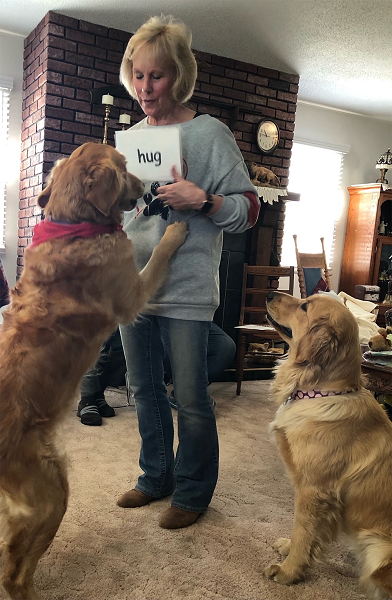
The Hancock-Henderson Quill, Inc.
by A. Lee Unger, The Quill
The Happy Helpers Club met April 6th in the home of Maxine Hilton with Glenda Unger serving as co-hostess. The program was given by Laurie Myers with the assistance of Barb Duffie as they presented Therapy dogs Rosie, Rhoda and Violet. The dogs are certified by Therapy Dogs International, headquartered in Flanders, New Jersey.
Barb Duffy is Laurie’s friend and loves the dogs. She therapy dog-tested Violet, (the dog pictured with Maxine Hilten), with Therapy Dogs International and Barb now is Violet’s official handler!
Laurie breeds and sells Golden Retriever dogs. To become a “therapy” dog, the dog must be born with the necessary characteristics but need to be one year old before it is known if they have the right personality.
Barb explained that you can teach dogs manners and behavior, but you cannot change the temperament of a dog. To be certified, the dogs go through 13 tests plus two written tests. Therapy dogs are also required to have a veterinarian examination once per year.
During the testing process dogs have to learn to ignore each other. Laurie says that is hard for the dogs, because they like to greet dogs they have not met just as we like to greet new friends. But the hardest part of the test is the command “leave it alone” when a treat is placed on the floor and the dog has to resist eating it. Only an official handler is supposed to feed the dog.
Laurie explained the difference between service, therapy and emotional support dogs. Service dogs are trained to do specific tasks or behaviors in order to assist a specific person with a disability.
Emotional support dogs primarily serve as companions and provide emotional support.
Service dogs and emotional support dogs are for just an individual. Therapy dogs display very good behavior and are comfortable with a variety of people, situations, and experiences.
There are no federal or state laws requiring registration or certification of service, therapy or emotional support dogs, she said. And there are not federal or state laws requiring the dogs to wear special identifying gear. However, she said, Therapy Dogs International require the dogs they certify to wear an identifying bandana when in public.
Therapy dog handlers who are members of Therapy Dogs International are covered for liability when doing volunteer work.
One of Laurie’s volunteer activities is “Paws for Reading” when she takes the dogs into the classroom and has three students per dog.
Two students pet the dog while the third student reads to the dog. Sometimes students having difficulty reading find reading to the dog easier than reading to themselves!
Laurie reminded us that you should always ask the dog’s owner before petting a dog.
Typically therapy dogs do not growl or bark when working, but one time, Laurie said, when visiting a grade school, her dog growled when meeting a man in the office. She apologized after the man left, but the principal said that it was all right. The man had been applying to be a substitute teacher, but they were not sure that they wanted him. They said her dog had just confirmed their decision not to use him! Dogs are good judges of character!

Laurie shows dogs can read, too!